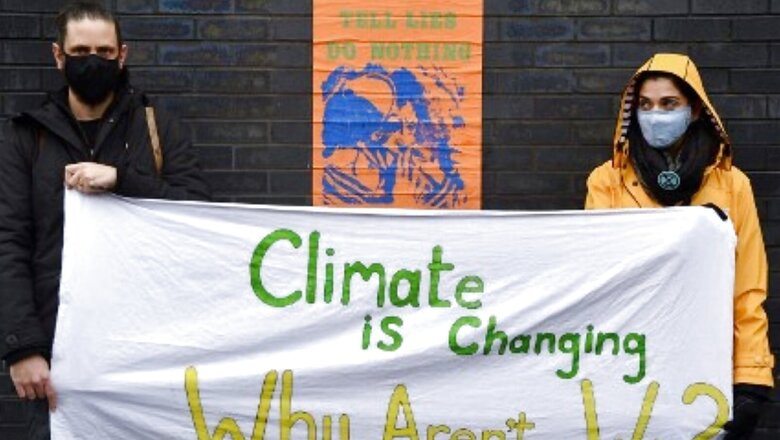
views
India was hit by one of its deadliest heatwaves in a month, putting many people’s lives in jeopardy. This has been labelled as a result of the huge climatic change that has taken place over the last few decades. Many emerging countries, not just India, are feeling the heat. Children in rich countries read books or watch television about what will happen, yet it is already happening in the Global South. The IPCC’s Sixth Assessment Report on the effects of climate change anticipated that the effects of rapid climate change such as glacier melting and permafrost thawing are already reaching irreversibility. According to the paper, if we continue to grow and urbanise cities without implementing proper mitigation and adaptation techniques, there will be an increase in heat-related deaths, most of which will occur in poor countries. As the discourse around it grows, it is incumbent on everyone to ensure that steps are implemented swiftly and fairly.
Devastating Impact in Global South
Climate change has been worsening the way of life in the Global South and the people residing here are the least to blame. Food insecurity in the global south has been increasing tremendously in the last few years. Farmers are no longer able to support the growth of crops due to extreme high temperatures and failing rainfall seasons. This hits the vulnerable population the most. Apart from this, there are risks of many low-lying islands disappearing due to rising sea levels, millions of people abandoning their homes due to changing weather patterns, land degradation and loss of livelihoods.
Global South, Climate Crisis and Need for Climate Justice
It is necessary to first define climate injustice in order to comprehend the concept of climate justice. Who are the folks who are contributing the most to the climate problem and who are enduring the brunt of it? When we look at the numbers, we can see that the average American pollutes over 20 times more than the average Nigerian and 10 times more than the average Indian. Typically, polluting countries such as India, China, and Brazil are blamed. There is no discussion of historical contributions to the toxins produced by developed countries that have remained in our atmosphere for a long time in this argument. The countries indicated above have only lately been involved in the problem and, hence, appear to be less responsible. They are, however, not only under international pressure to reduce emissions to zero, but also under the wrath of the climate crisis in the form of catastrophic occurrences. India has endured extreme weather disasters in the form of floods and cyclones during the last 10 years, which have claimed lives, destroyed homes and agricultural output, and resulted in massive income losses. The sad part is that the people who are experiencing the extremes have no idea what is triggering them.
Reiterating Sustainable Development
As developing countries expand their urbanisation efforts, they have the opportunity to rethink their overall planning and construction strategies. Our systems must be resilient and sustainable in order for the future to be feasible. This will aid in the preservation of our food systems, the protection of people from harsh weather occurrences, and the creation of prosperity for everybody. Aside from smart city design, we must reduce our usage of fossil fuels and meat intake. Many places in the Global South are resource-scarce, and so report resource-related tensions. The conflicts can be exacerbated by unsustainable growth. Mobilisation of financial resources, capacity building, and technology cooperation are all essential for long-term success.
Climate Action is a Shared Responsibility
As climate change is a shared responsibility so is climate action. An international coordinated effort is our greatest hope for limiting possibly terrible repercussions. No country can refuse to pay its fair share since this will turn developing economies into reliant economies and push the populace further into poverty. Developed and industrialised countries must take the lead in achieving global net carbon reductions.
Reduced accountability on part of some countries would undoubtedly place a burden on other countries. There are currently no sanctions in place for governments who fail to follow through on their promises and obligations. These must be implemented to enforce harsher regulations. Aside from that, developing countries must invest financial resources to help poorer countries adapt and mitigate the effects of climate change.
There is an imperative need for not only immediate climate action but also for climate justice. The issue of the climate crisis is multifaceted and multi-layered. Mitigation methods for the developing world must be well investigated and implemented. If we do not act immediately, climate change will undo the gains we have achieved in collaborating for the wealth and peace of our globe. Those who are most vulnerable will bear the brunt of the cost. We only have a limited amount of time to meet our broader mitigation and adaptation aims. We will only be able to get where we need to go if we work together globally.
Mahek Nankani is Assistant Programme Manager at The Takshashila Institution. The views expressed in this article are those of the author and do not represent the stand of this publication.
Read all the Latest Opinions here



















Comments
0 comment